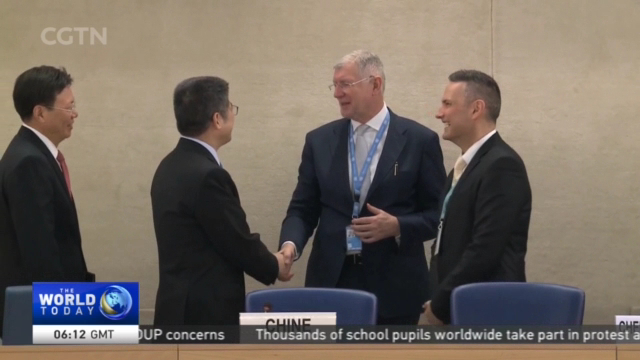
14:56, 16-Mar-2019
China Human Rights: UN Human Rights Council finishes review of China
Updated
14:50, 19-Mar-2019
04:01

The UN Human Rights Council has formally wrapped up its review of China. Chinese Vice Foreign Minister Le Yucheng, as well as China's Geneva representative Yu Jianhua, and other officials attended the session. Our reporter Xi Jia has more.
Every four to five years, UN members undergo human rights screening also known as the Universal Periodic Review, or UPR. On Friday, the Human Rights Council approved a review of China without a vote. During the session, Executive Vice Foreign Minister Le Yucheng responded to more than 200 human rights recommendations by other countries on ways Beijing could improve its human rights record. China accepted 284 out of 346 recommendations, accounting for 82% of the total number. The number and proportion are among the top of other major countries. But China has also rejected 62 of them.
LE YUCHENG CHINESE VICE FOREIGN MINISTER "There are 62 recommendations that China has not adopted. Some of them are not in line with China's national conditions, or the conditions are not mature, inconsistent with the facts, or with political prejudice. For example, some countries suggest China abolish the death penalty. Taking into comprehensive consideration of China's national conditions, law practice and public opinion, there is currently no implementation conditions for this. There are also proposals from some states to stop the massive arbitrary detention. This is essentially a matter of interference under the name of human rights. China resolutely opposes it."
Le Yucheng also denounced the distortion applied on Xinjiang training and education centers.
LE YUCHENG CHINESE VICE FOREIGN MINISTER "Recently, China has invited a number of foreign officials, political party representatives, diplomatic envoys, journalists, and scholars to visit Xinjiang and local education and training centers. Among them were diplomatic envoys and representatives in Geneva. I myself last month went to Xinjiang, visiting teaching and training centers, violent case exhibitions, and religious sites. I had in-depth exchanges with local people and tourists."
Le Yucheng says the safety and stability of people's lives in Xinjiang is the fundamental interest, in that case, anti-terrorism is of great importance. Those education and training centers are only boarding schools and campuses rather than concentration camps claimed by some media reports. He added there are over 24,000 mosques in Xinjiang. After Le Yucheng's speech, 13 countries including Nigeria and the Philippines took the floor respectively, and expressed their appreciation of China's acceptance of so many recommendations. They also praised Beijing for progress in human rights. Le Yucheng reiterated later in a news conference the significance of Xinjiang's safety and stability.
LE YUCHENG CHINESE VICE FOREIGN MINISTER "The Xinjiang issue is not a matter of human rights and religious belief. It concerns stability of Xinjiang and China's sovereignty and territorial integrity. For a long time, Xinjiang has been deeply affected by terrorism since the 1990s. Thousands of terrorist attacks have occurred, causing serious harm to the lives and property of local people, which tramples on basic human rights. No country or government would sit idly by."
XI JIA GENEVA "China says different countries have different criteria. Vice Minister Le Yucheng says China is open to accept all recommendations that are line with its national conditions and conducive to improving its human rights. Xi Jia, CGTN, GENEVA, SWITERLAND."

SITEMAP
Copyright © 2018 CGTN. Beijing ICP prepared NO.16065310-3
Copyright © 2018 CGTN. Beijing ICP prepared NO.16065310-3